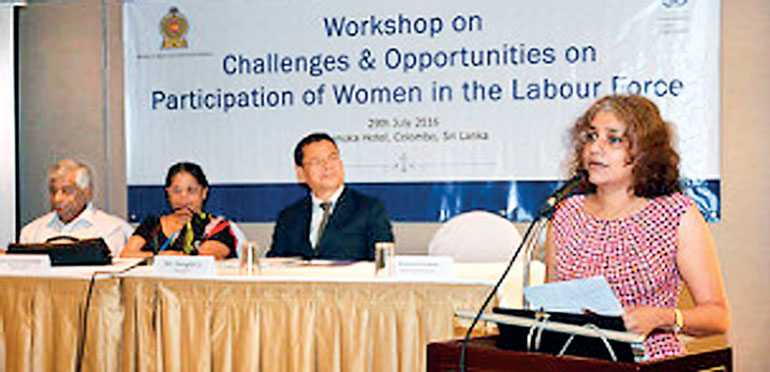Saturday Feb 21, 2026
Saturday Feb 21, 2026
Friday, 19 August 2016 00:01 - - {{hitsCtrl.values.hits}}

EFC Assistant Director General Ayomi Fernando addressing the gathering
In the backdrop of the paradoxical setting where high literacy rates do not correspond to the labour input, revisiting our education system to find answers to mitigate certain gaps prevalent in the labour force in terms of gender equality is imperative, noted Employers’ Federation of Ceylon (EFC) Assistant Director General Ayomi Fernando in her opening remarks made at a workshop organised by the ILO recently.
The workshop which was held at Hotel Renuka, Colombo on the theme of ‘Challenges and opportunities in participation of women in the labour force’, featured the findings of three important studies. Dr. Ramani Gunatilaka’s study focused on ‘Women’s Activity outcomes, preferences and time use in Western Sri Lanka’ and the study by Shyamalie Ranaraja and Shafinaz Hassendeen delved into the ‘Demand-side factors affecting women’s labour force participation in Sri Lanka’. The third study by Dr. Nisha Arunatilaka, focused on integrating Sri Lankan migrant workers into the national labour force statistics.
The EFCs Assistant Director General further remarked that both structural changes and a shift in perceptions are vital if we are to find answers to what makes women absent from the labour force. „Most countries in our region are affected by globalisation but lack the capacity to think ahead and engineer our labour force,” maintained Fernando who reiterated the necessity to map out what jobs are attractive to Sri Lankan women, what sectors offer opportunities for them in line with global trends and what discourages them from taking up certain available jobs.
Illustrating with the South East Asian experience of high engagement in female entrepreneurship, Fernando explained that the low volume perceived in the South Asian region is a matter of concern. She also noted that the move by the EFC member companies to engineer their CSR activities around the supply chain in which women form an integral component, is a positive one. “This is an area where entrepreneurship can garner tangible results.”
The need for amendments in domestic labour laws is unprecedented to harness more female labour force participation, she said, reminding that the EFC has always strived to promote a ‘level playing field’ at work by lobbying for labour law reforms and encouraging employers to provide more job opportunities for women. However the State has probably the most important role to play in addressing the many structural barriers which exist.
“Maternity benefits, which currently fall entirely on employers is required to be a shared responsibility by ILO Convention 103.,” remarked Ms. Fernando who also noted that most Asian countries lag far behind in terms of child care which becomes a stumbling block to harness better female labour input.
Reiterating the need for labour laws which ideally should meet the demands of the modern world of work, the Assistant Director, EFC brought under the spotlight the conflict between the present legislation and the actual needs of industries. She drove this message home in the backdrop of the garment sector where employees who aspire to rejoin the workforce are barred from doing so due to legal stumbling blocks.
“When such workers wish to rejoin the workforce and build their work around their family responsibilities such as working a shift per day, despite the employers’ willingness to harness their skills, they are discouraged from doing so in terms of the law pertaining to leave entitlements, wages and pro-rating,” she asserted.
In his opening remarks, the ILO Country Director for Sri Lanka and Maldives Donglin Li noted that the ILO strongly believes in gender equality at the workplace as ‘not just the right thing to do, but that it is good for business.’ He also pointed out that although Sri Lanka has ratified all four key ILO Conventions – Equal Remuneration convention, Discrimination (Employment and Occupation), Workers with Family Responsibilities and Maternity Protection Convention, the implementation and enforcement of them still need to be more strengthened. In championing the decent work agenda in the country, the ILO is committed to support all initiatives which ensure gender equality in Sri Lanka, said Li further.